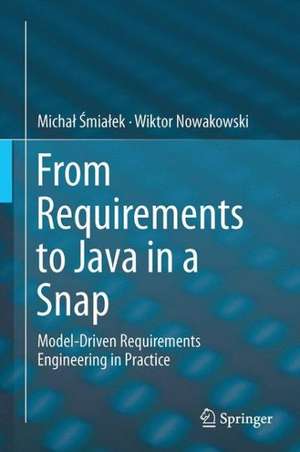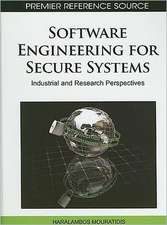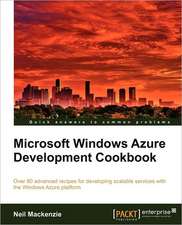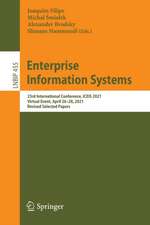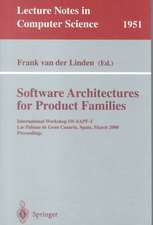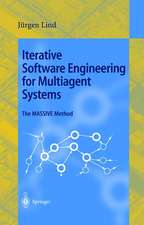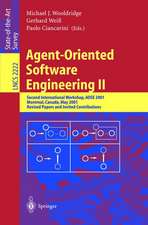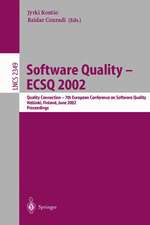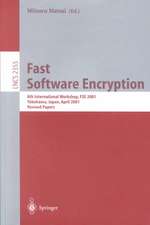From Requirements to Java in a Snap: Model-Driven Requirements Engineering in Practice
Autor Michał Śmiałek, Wiktor Nowakowskien Limba Engleză Hardback – 26 ian 2015
The book is structured in eight chapters. The first two chapters present the main concepts and give an introduction to requirements modelling in RSL. The next two chapters concentrate on presenting RSL in a formal way, suitable for automated processing. Subsequently, chapters 5 and 6 concentrate on model transformations with the emphasis on those involving RSL and UML. Finally, chapters 7 and 8 provide a summary in the form of a systematic methodology with a comprehensive case study.
Presenting technical details of requirements modelling and model transformations for requirements, this book is of interest to researchers, graduate students and advanced practitioners from industry. While researchers will benefit from the latest results and possible research directions in MDRE, students and practitioners can exploit the presented information and practical techniques in several areas, including requirements engineering, architectural design, software language construction and model transformation. Together with a tool suite available online, the book supplies the reader with what it promises: the means to get from requirements to code “in a snap”.
| Toate formatele și edițiile | Preț | Express |
|---|---|---|
| Paperback (1) | 336.35 lei 6-8 săpt. | |
| Springer International Publishing – 24 sep 2016 | 336.35 lei 6-8 săpt. | |
| Hardback (1) | 342.78 lei 6-8 săpt. | |
| Springer International Publishing – 26 ian 2015 | 342.78 lei 6-8 săpt. |
Preț: 342.78 lei
Preț vechi: 428.48 lei
-20% Nou
Puncte Express: 514
Preț estimativ în valută:
65.61€ • 71.29$ • 55.15£
65.61€ • 71.29$ • 55.15£
Carte tipărită la comandă
Livrare economică 21 aprilie-05 mai
Preluare comenzi: 021 569.72.76
Specificații
ISBN-13: 9783319128375
ISBN-10: 331912837X
Pagini: 350
Ilustrații: XXIII, 352 p. 295 illus.
Dimensiuni: 155 x 235 x 24 mm
Greutate: 0.7 kg
Ediția:2015
Editura: Springer International Publishing
Colecția Springer
Locul publicării:Cham, Switzerland
ISBN-10: 331912837X
Pagini: 350
Ilustrații: XXIII, 352 p. 295 illus.
Dimensiuni: 155 x 235 x 24 mm
Greutate: 0.7 kg
Ediția:2015
Editura: Springer International Publishing
Colecția Springer
Locul publicării:Cham, Switzerland
Public țintă
ResearchCuprins
1. Introducing Requirements-driven Modelling.- 2. Presenting the Requirements Specification Language.- 3. Defining RSL.- 4. Explaining RSL with Java.- 5. Understanding Model Transformations.- 6. Writing Model Transformations for Requirements.- 7. Applying MDRE in Practice.- 8. Case study.- A. Summary of RSL syntax.- B. Summary of MOLA syntax.
Notă biografică
Michał Śmiałek is a professor in the Department of Theory of Electrical Engineering and Applied Informatics at Warsaw University of Technology (Poland) and leads the SMoG research group that develops methods and tools for requirements-based model-driven development. In addition, he has over 20 years of experience in software development as a programmer, analyst, process engineer and project manager.
Wiktor Nowakowski is a researcher in the Department of Theory of Electrical Engineering and Applied Informatics at Warsaw University of Technology. His main areas of research are in requirements engineering, model-driven software development and software language engineering. Wiktor also has extensive industry experience working on small- to large-scale projects, mainly as a business systems analyst.
Wiktor Nowakowski is a researcher in the Department of Theory of Electrical Engineering and Applied Informatics at Warsaw University of Technology. His main areas of research are in requirements engineering, model-driven software development and software language engineering. Wiktor also has extensive industry experience working on small- to large-scale projects, mainly as a business systems analyst.
Textul de pe ultima copertă
This book provides a coherent methodology for Model-Driven Requirements Engineering
which stresses the systematic treatment of requirements within the realm of modelling and
model transformations. The underlying basic assumption is that detailed requirements models are used as first-class artefacts playing a direct role in constructing software. To this end, the book presents the Requirements Specification Language (RSL) that allows precision and formality, which eventually permits automation of the process of turning requirements into a working system by applying model transformations and code generation to RSL.
The book is structured in eight chapters. The first two chapters present the main concepts and give an introduction to requirements modelling in RSL. The next two chapters concentrate on presenting RSL in a formal way, suitable for automated processing. Subsequently, chapters 5 and 6 concentrate on model transformations with the emphasis on those involving RSL and UML. Finally, chapters 7 and 8 provide a summary in the form of a systematic methodology with a comprehensive case study.
Presenting technical details of requirements modelling and model transformations for requirements, this book is of interest to researchers, graduate students and advanced practitioners from industry. While researchers will benefit from the latest results and possible research directions in MDRE, students and practitioners can exploit the presented information and practical techniques in several areas, including requirements engineering, architectural design, software language construction and model transformation. Together with a tool suite available online, the book supplies the reader with what it promises: the means to get from requirements to code “in a snap”.
which stresses the systematic treatment of requirements within the realm of modelling and
model transformations. The underlying basic assumption is that detailed requirements models are used as first-class artefacts playing a direct role in constructing software. To this end, the book presents the Requirements Specification Language (RSL) that allows precision and formality, which eventually permits automation of the process of turning requirements into a working system by applying model transformations and code generation to RSL.
The book is structured in eight chapters. The first two chapters present the main concepts and give an introduction to requirements modelling in RSL. The next two chapters concentrate on presenting RSL in a formal way, suitable for automated processing. Subsequently, chapters 5 and 6 concentrate on model transformations with the emphasis on those involving RSL and UML. Finally, chapters 7 and 8 provide a summary in the form of a systematic methodology with a comprehensive case study.
Presenting technical details of requirements modelling and model transformations for requirements, this book is of interest to researchers, graduate students and advanced practitioners from industry. While researchers will benefit from the latest results and possible research directions in MDRE, students and practitioners can exploit the presented information and practical techniques in several areas, including requirements engineering, architectural design, software language construction and model transformation. Together with a tool suite available online, the book supplies the reader with what it promises: the means to get from requirements to code “in a snap”.
Caracteristici
Applies model transformation techniques and code generation to automate the development of software systems from requirements Applicable to both functional requirements and vocabulary requirements (domain definitions) Accompanied by a tool suite freely available online Includes supplementary material: sn.pub/extras
